Key takeaways:
- Self-advocacy empowers individuals experiencing homelessness to reclaim their dignity and assert their needs, leading to positive changes in their situations.
- Development of self-advocacy skills can be enhanced through workshops, journaling, and role-playing scenarios, which build confidence in articulating needs.
- Active listening and gathering information about rights and available resources are essential strategies for effective self-advocacy, promoting clarity and empowerment.
- Overcoming internal and external challenges, including fear and emotional barriers, is vital to successfully advocating for oneself in difficult situations.
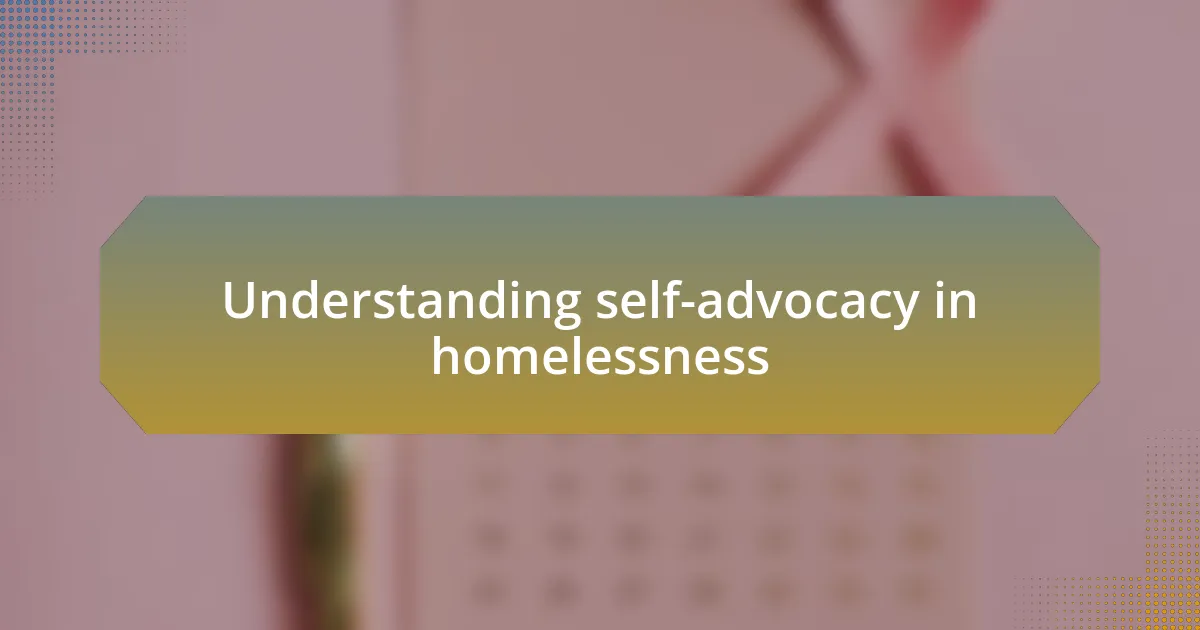
Understanding self-advocacy in homelessness
Self-advocacy in homelessness is about knowing your worth and standing up for your rights. I remember a time when I hesitated to ask for help; the fear of rejection loomed large. But then I thought, “What’s worse, asking for support or continuing to struggle in silence?” That moment changed everything for me.
Navigating systems designed to assist those experiencing homelessness can be overwhelming. During my own journey, I felt like a mere number in a crowded room, yet I realized that only I could articulate my needs effectively. I found my voice by practicing small assertive actions, like simply requesting what I needed from service providers – it was empowering to see them respond positively.
There are days when self-advocacy feels like an uphill battle; it’s natural to feel disheartened. I once faced a situation where my concerns were dismissed, but instead of retreating, I pushed back with determination. I learned that persistence and clear communication could turn the tide in my favor, creating pathways to better resources and support. How can we expect change if we don’t speak up?
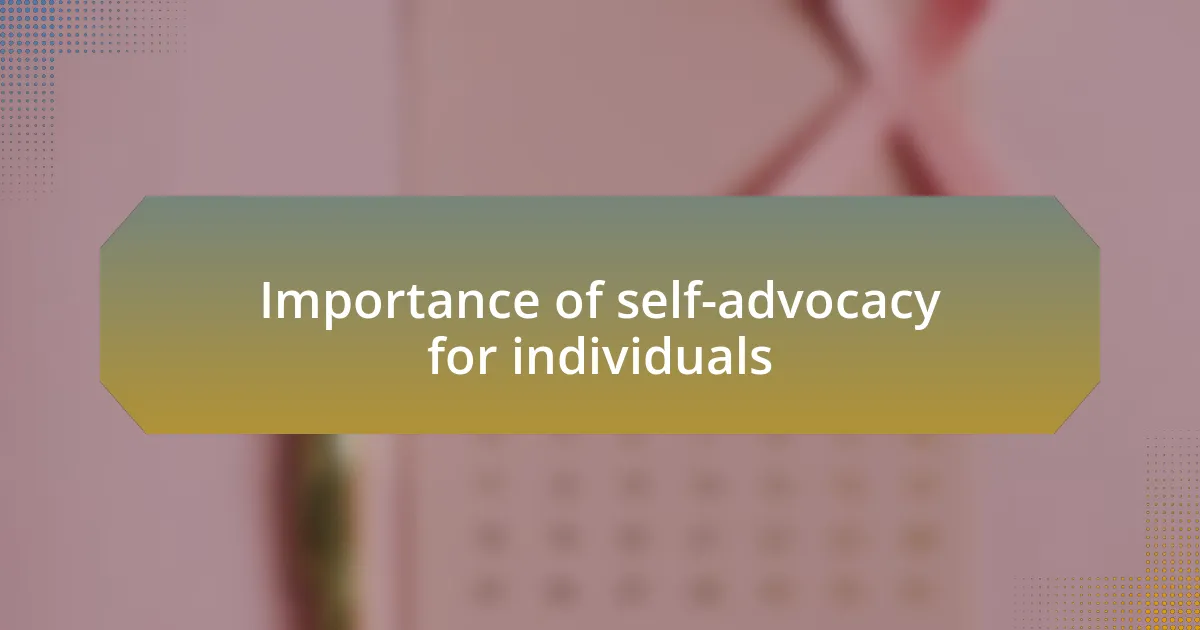
Importance of self-advocacy for individuals
Self-advocacy is crucial in empowering individuals to reclaim their autonomy and dignity in the face of adversity. I recall a time when I sat in a meeting with a housing assistance representative who seemed uninterested in my situation. It struck me that if I didn’t speak up about my circumstances, they would only see the surface; by sharing my story passionately, I witnessed a shift in their attitude. This experience highlighted that our voices matter in influencing the perspectives of those in positions to help.
Articulating needs isn’t just about getting services; it’s about fostering a sense of agency. When I began to voice my concerns regarding my living conditions, I felt the weight of my struggles lessen. It became clear to me that expressing my needs wasn’t just a right—it was a necessary step toward empowerment. How can we begin to demand better support if we don’t first assert what we want and deserve?
Moreover, self-advocacy cultivates resilience. I remember facing repeated setbacks, yet each time I persisted in sharing my experiences, I not only grew stronger, but I also inspired others around me. The more I advocated, the more I realized that my story could fuel change for someone else as well. Doesn’t that sense of connection and purpose make the effort worthwhile?
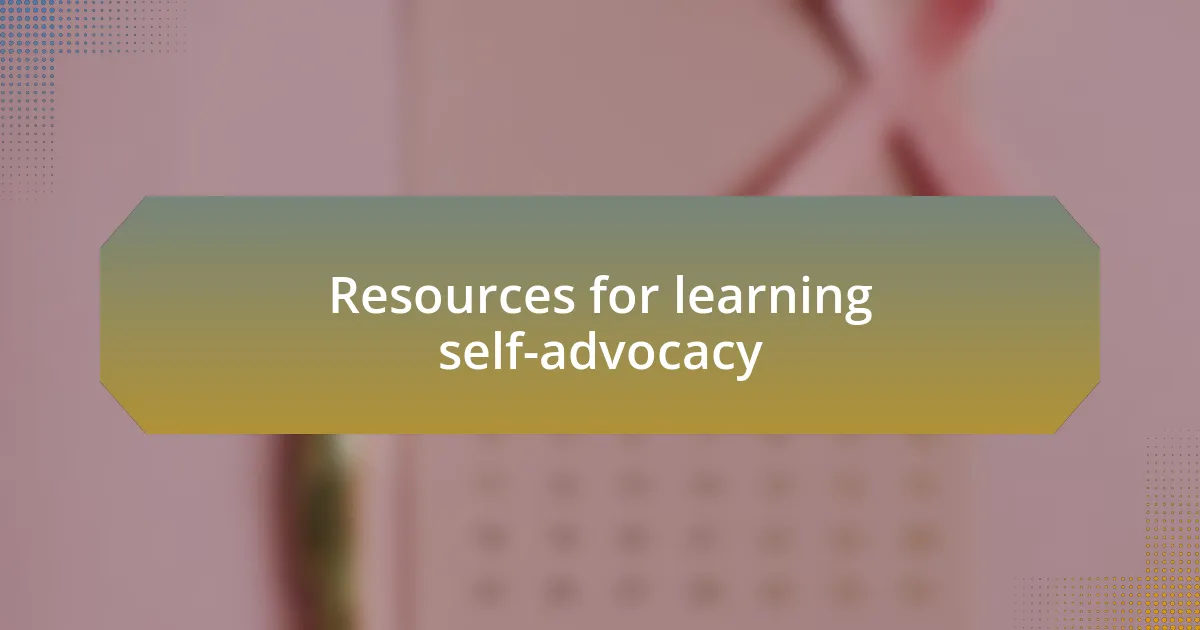
Resources for learning self-advocacy
Understanding the resources available for learning self-advocacy can dramatically enhance one’s confidence and effectiveness. I remember discovering a local workshop focused on navigating social services. Attending that session, I learned not only practical skills, like how to draft a formal request for aid, but also gained a network of support from others in similar situations. It struck me how important it is to connect with individuals who are also striving for their own voices—don’t we often find strength in community?
Reading books on self-advocacy was another pivotal resource for me. One title that resonated deeply is “The Power of Self-Advocacy,” which provided real-life stories alongside actionable steps. Each chapter reminded me why it’s essential to own my narrative. How often do we feel alone in our struggles, only to find that shared experiences can illuminate our path forward?
Online forums and social media groups offer an invaluable platform for ongoing learning and support. I once engaged in a discussion about handling difficult interactions with service providers, and I felt reassured by the diverse strategies shared. Isn’t it empowering to know that there’s a wealth of knowledge just a few clicks away? These resources not only educate but also validate our experiences, showing us that self-advocacy is a journey worth undertaking.
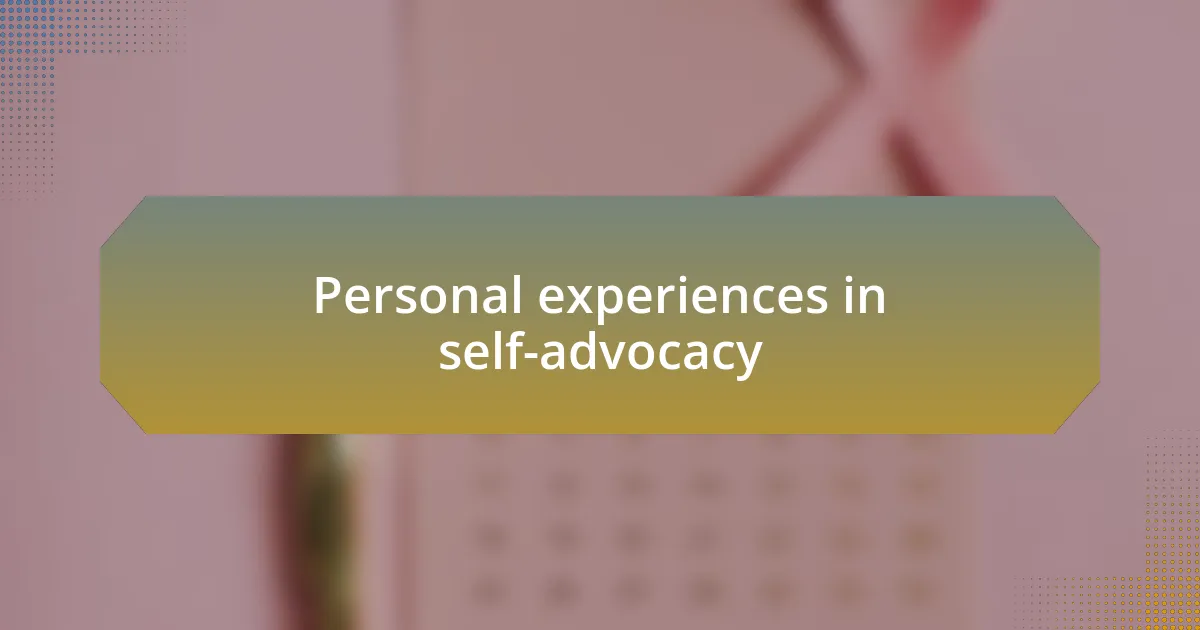
Personal experiences in self-advocacy
Self-advocacy often blossomed in unexpected moments for me. I vividly remember a time when I was at a shelter, needing urgent medical assistance. I found my voice when I politely but firmly expressed my concerns to the staff, advocating for timely care. It was a small victory, but it made me realize how crucial it was to speak up for my needs, reinforcing my belief that we all deserve to be heard.
On another occasion, I participated in a community meeting about local housing initiatives. It was intimidating at first, sitting in a room full of decision-makers, but I shared my perspective on the impact of homelessness on mental health. The room fell silent as my words resonated with others. Was I the only one feeling such desperation? Apparently not, as I soon discovered that many were eager to engage in deeper conversations about our collective experiences.
I learned that self-advocacy thrives through vulnerability. I recall sharing my story at an open-mic event aimed at raising awareness about homelessness. Standing there, I felt a rush of nerves, yet the warmth from the audience was undeniable. They responded with empathy, and I realized that sharing my truth not only empowered me but also gave others the courage to tell their stories. Isn’t it remarkable how our voices can spark change within ourselves and our communities?
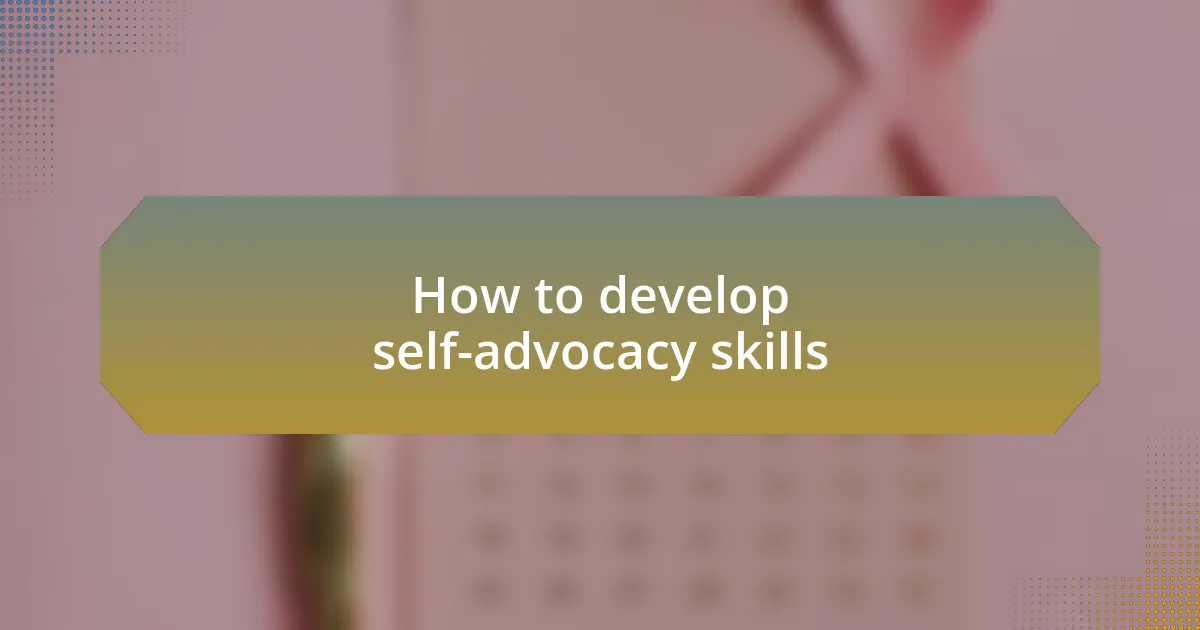
How to develop self-advocacy skills
To develop self-advocacy skills, I found that embracing discomfort is essential. I remember attending workshops where I was encouraged to express my needs—initially, I stumbled over my words. But over time, that practice helped me see vulnerability as a strength, not a weakness. Was it scary to speak up in a room filled with strangers? Absolutely. Yet every attempt reinforced my belief that my voice mattered.
Journaling became a powerful tool in my journey. I started writing down my thoughts and feelings about what I wanted to advocate for. Through this process, I could clarify my needs and formulate arguments for why they should be met. Have you ever tried expressing your feelings on paper? It can be enlightening, as you begin to understand the core issues affecting you. For me, this practice was transformative; it turned confusion into clarity.
Role-playing scenarios with friends can be incredibly beneficial as well. I remember getting together with a few trusted peers to practice how to approach difficult conversations. We set up mock situations where we role-played advocacy dialogues. This safe space allowed me to refine my approach and gain confidence. It made me wonder—how different would my experiences be if everyone had this opportunity? By taking these steps, we can empower ourselves and others to stand up for our needs.
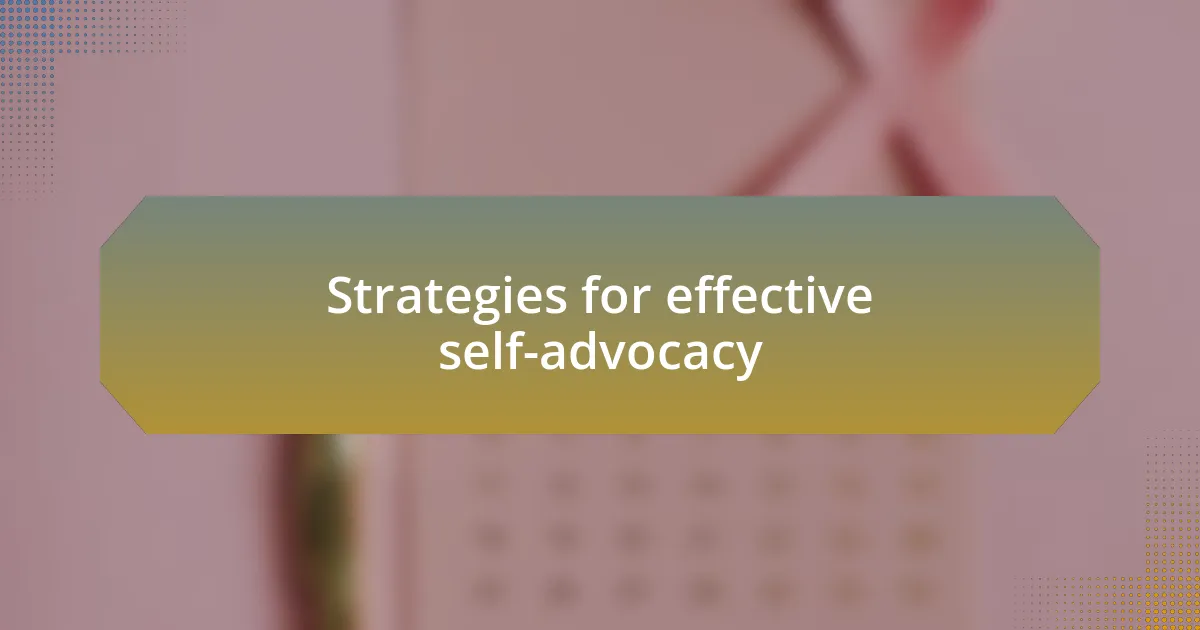
Strategies for effective self-advocacy
One effective strategy I discovered is the power of active listening. In my experience, really paying attention to others during discussions not only enhances communication but also models the kind of dialogue I wanted in return. Have you ever noticed how it feels when someone genuinely hears you? It creates a bond and fosters an environment where both parties feel valued, making it easier to articulate your own needs.
Another technique that served me well was gathering information about my rights and available resources. When I took the time to research what support systems were out there, I felt more empowered. I recall reaching out to a local resource center and learning about advocacy groups that could assist me. This knowledge was like finding a flashlight in the dark; it illuminated pathways I never knew existed and equipped me to approach my challenges with confidence.
Finally, practicing assertiveness has been a game-changer in my journey. I learned to clearly state my needs without apologizing or shrinking back. One memorable moment was during a meeting when I spoke up about my housing options. My heart raced, but I expressed my frustrations openly and respectfully. It surprised me how much respect I gained just by being direct. Have you ever thought about how an assertive approach could shift your interactions? It’s not just about speaking; it’s about believing your voice deserves to be heard.

Overcoming challenges in self-advocacy
It’s not uncommon to encounter barriers when self-advocating, especially in challenging situations. I remember feeling invisible during a critical meeting regarding my housing situation. The tone in the room was dismissive, and I felt my voice waver as I fought to be heard. It was in that moment I realized that overcoming the discomfort of confrontation was crucial. Have you ever grappled with the fear of speaking up? When I embraced my discomfort, I found that persistence could break through indifference.
Sometimes, the challenges I faced were internal, rooted in my own doubts. I often wondered if I was worthy of the support I sought. I distinctly recall a time when I hesitated to ask a social worker for clarification about my benefits. It struck me later that asking questions was not a sign of weakness but a vital part of advocating for myself. Each time I pushed past my hesitation, I grew a little stronger in my conviction that my needs mattered. Isn’t it empowering to recognize that our voices can question the status quo?
In other instances, my emotional state would threaten to derail my advocacy efforts. I vividly recall attending a workshop on homelessness rights, feeling overwhelmed by the sheer volume of information thrown my way. At first, I wanted to retreat into silence, but instead, I forced myself to take a few notes and formulate questions. Sitting there, I realized that even in the most chaotic moments, my desire to understand could guide me forward. Who knew that embracing the chaos could fuel my determination? That experience taught me that acknowledging my emotions was just as important as articulating my needs in the quest for self-advocacy.